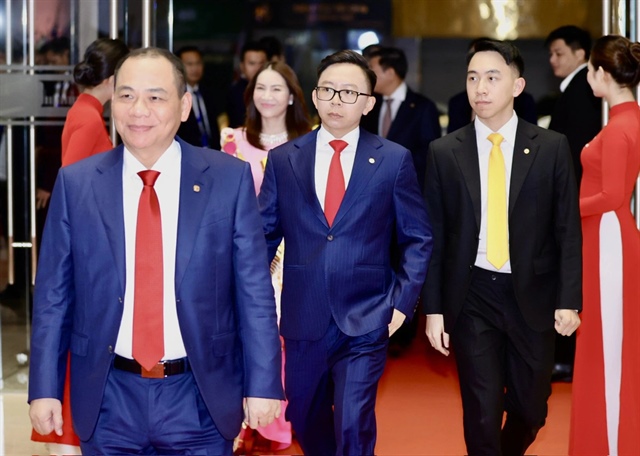Too much preferential treatment to foreign firms, official says
Too much preferential treatment to foreign firms, official says
Vietnam should give more incentives to domestic firms, as the current preferential policies toward FDI firms may hinder the nation's development and result in dependance, one official said.

The minister of Planning and Investment, Bui Quang Vinh answered some questions on the subject during a dialogue called "People question, ministers answer" hosted by the Vietnamese Government portal last week.
Vietnam attracted only USD3.3 billion in foreign direct investment (FDI) during the first quarter of this year, just half of the amount attracted during the same period last year. What is the reason for this, and is it a worrying signal?
The quarter-based comparison does not adequately reflect the real situation. During the first quarter of 2013 Vietnam attracted two major FDI projects, including a USD2 billion Samsung Thai Nguyen project in Thai Nguyen Province and a USD2.8 billion Nghi Son oil refinery-petrochemical complex in central Thanh Hoa Province. These two projects dramatically drove up the numbers for that period. These projects had been in negotiation for several years before officially receiving the capital.
The country did not attract such major projects during the first quarter of this year. This does not mean that the country’s investment environment is less attractive than it was a year earlier.
The total amount of FDI this year is expected not be less than last year because some projects that are under negotiation are expected to be signed in 2014.
Apart from attracting foreign investment, part of the benefit of FDI is the transfer of technology. However, to date the country has yet to report statistics on technology transfer through FDI projects. What are your comments about this?
Nearly 16,000 FDI firms have invested in Vietnam mainly under the form of wholly foreign-invested projects, so the demand and conditions for direct technology transfer to joint venture partners is rather modest.
A report on FDI in Vietnam over the past decades has also shown that technology transfer is still modest, estimated at only 5%. However, we should not be pessimistic about this. FDI firms that have invested in Vietnam have had an indirect effect on our country’s economic structure and the ongoing restructuring process. This enhances our competitiveness and has fostered technology transfer.
Recently, Nicolas Audier, member of the Executive Committee of EuroCham in Vietnam, commented on the result of FDI in Vietnam in the first quarter of this year that concerns over legal issues that have discouraged foreign investors who want to invest in Vietnam, particularly M&A and public-private partnership (PPP) procedures. What are your comments about this?
Vietnam’s business and investment climate is not ideal. Vietnam is still a developing country and its legal system has been being gradually changing to accommodate the changing economic realities.
In terms of M&A, it is still relatively new to Vietnam, so we have yet to create a comprehensive legal system to handle all scenarios.
This issue is expected to be supplemented into the Investment Law when it is amended in the near future. M&A is an important issue for the near future as we are stepping up the privatisation of state-owned enterprises (SOEs) and economic restructuring.
PPP is also a new form of investment in Vietnam. Currently, the Ministry of Planning and Investment has been assigned by the government to compile regulations on the issue. We’re gathering opinions from many international organisations, major foreign investors and foreign countries. A decree on PPP is expected to be issued this year and international donors think that it will meet international norms.
In recent years, we’ve offered many incentive policies to foreign investors while domestic firms have struggled with cumbersome administrative procedures.
Will we change policies for domestic firms, especially private local firms in the time to come?
It is not true that we only offer incentive policies to FDI firms. However, frankly speaking, we’ve paid more attention to FDI firms. It is true that FDI firms play an important role in national economic development as we are lacking in investment, business experience and science and technology. Many other countries are in the same situation as Vietnam’s, so they too have to attract foreign investment.
However, it’s important to realise that if we don’t pay proper attention to domestic firms, we may not succeed in economic development. We may be dependent on FDI firms because we’ve offered too much favour to them. So, domestic enterprises would be among the major driving forces for the country’s development in the time to come.
Domestic firms encompass SOEs and private firms. Currently, we’re focusing on the restructuring of SOEs by asking them to withdraw capital from non-core businesses and to speed up privatisation.
More attention should be paid to private firms due to their sheer numbers and the important role they play in the national economy. In the near future, the government plans to seek approval from the National Assembly for amending two laws, the Law on Enterprises and Investment Law, in order to encourage the development of the private sector.
Are these policies still unclear?
We’ve mentioned this issue several times and included it in the amended Constitution but we need more specific regulations of this matter.
Under the Law on Enterprises, private firms would be exempted from registering their fields of business in their business registration certificate. Meanwhile, the Investment Law would also do away with investment licenses for several fields.
We’ll conduct inspections of the implementation of these policies in order to ensure fairness in all economic sectors.
vietnamnet




















